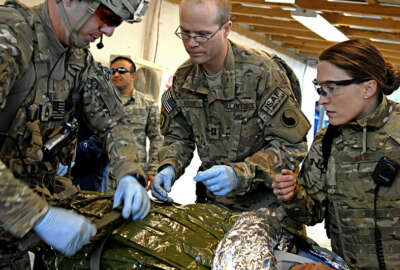The Defense Department says its capabilities to aid the domestic health care system during the coronavirus are limited and are not catered toward infectious diseases.
The Pentagon is working as part of the whole-of-government approach to combat the virus, and providing civil assistance when asked — like evacuating civilians from China and the two cruise ships infected with the COVID-19, a strain of the coronavirus.
“What we are trying to be very careful about is not overpromising,” said Joint Staff Surgeon General Brig. Gen. Paul Friedrichs at the Pentagon Monday. “We want to be factual about what we have. Our fixed facilities are designed to the force that we have. They are not thousand-bed medical centers all over the United States. They are, for the most part, small community hospitals.”
Domestically, DoD has 36 hospitals that range in size from small facilities to large complexes like Walter Reed National Medical Center.
Pentagon Spokesman Jonathan Hoffman said the department accounts for about 2% to 3% of hospital beds in the nation.
“We have not seen huge demand signals coming to DoD yet saying we have a huge demand gap,” Friedrichs said. “What we do have are these tailorable packages and some of them can move very quickly by airplane. Others are much larger like hospital ships.”
Friedrichs said DoD can build hospital tents and move people to ships if necessary, but those stand-up capabilities are not made for infectious disease treatment.
“The challenge is if we build a 200-bed or a 25-bed trauma hospital to take care of people with coronavirus, that’s not really a great solution to the coronavirus challenge,” Friedrichs said. “We don’t have any 500-bed hospitals designed for infectious disease outbreaks. That does not exist in the inventory.”
Hospital ships, for example, are stacked with beds and have open bay areas, which would be more likely to spread the virus.
Regardless, DoD is looking into how fast those extra capabilities can be deployed.
Hoffman would not divulge how many respirators DoD has in its inventory.
Beds without doctors
The other issue is personnel. The Pentagon would need to mobilize doctors from other places to fill the facilities it creates.
Friedrichs said medical professionals would have to come from existing hospitals if they were called up from the reserves or the National Guard.
“There aren’t a thousand or 1,200 medical professionals with a hospital ship waiting. They have to come from somewhere else,” Hoffman said. “The personnel aren’t sitting there waiting to be deployed. They are in a hospital in Lackland Air Force Base or they are somewhere else.”
Pentagon precautions
DoD is adding more insurances to protect its workforce. The department is already trying to maximize telework.
Hoffman said DoD is keeping the defense secretary and deputy defense secretary and their staffs separated to cut down on the possibility of transmission.
National Guard response
So far, 15 states called up more than 640 Army and Air National Guard members for assistance with the outbreak.
The missions include: drive through testing facilities; response liaisons and support to state emergency operations centers; support to healthcare professionals; logistics support; assisting with disinfecting/cleaning of common public spaces; providing transportation support for health care providers; collecting and delivering samples and assisting with sample administration.
“Bottom line, our force must remain flexible, innovative and ready to help America mitigate the impacts of this virus,” said Gen. Joseph Lengyel, National Guard Bureau chief. “I trust the Adjutants General in the 50 states, three territories and District of Columbia will continue to make decisions at their level to ensure our force of 450,000 people will be ready when their governors’ call.”
Copyright
© 2024 Federal News Network. All rights reserved. This website is not intended for users located within the European Economic Area.

